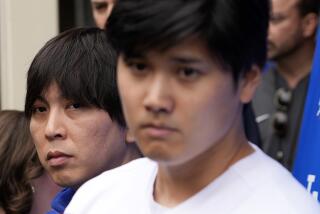His ‘Victory’ in Japan Has Been No Boon for Pickens : Business: The U.S. greenmail artist is the first victim of a law modeled on American rules.
T. Boone Pickens’ shouts finally have been heard in Japan. But what an echo!
In the cacophonous uproar that often characterizes the U.S.-Japan trade dialogue, his voice is among the loudest. He has called for Japan to change, to open up to American investment, to behave, in short, more like us.
His persistent pleas appear to have had some effect. Major shake-ups are now occurring in Japan that will shed new light on keiretsu --the networks of interlocking directorates and cross-ownership among Japanese companies that have been Pickens’ bete noire . But, in a delicious irony, the first victim of these changes is not Japanese, but none other than Pickens, America’s loudest Japan-basher and greenmail artist.
With the dialogue known as the Structural Impediments Initiative (SII), in which the United States and Japan have critiqued each other’s economic behavior, both sides have agreed to effect major change. The United States pledged to tame its addiction to deficits, debt and short-term profits. Japan promised to increase public spending, enforce its anti-monopoly laws and improve shareholder standing in the Japanese corporate system.
Although there is no doubt room for greater shareholder rights in Japan, it is clear that a large measure of its extraordinary economic success arises from the Japanese corporate inclination to place the interests of customers and employees ahead of shareholders. This is not all bad. The American system, in which shareholder happiness is the dominant value, leads to managers’ preoccupation with keeping the stock price and dividends up to avoid hostile raids.
Linked to the issue of shareholder rights is the keiretsu. This is a system of close relationships and cross-shareholdings, usually with a bank in the center and including an insurance company, manufacturing operations, a trading company, and various vendors and customers. According to the popular American press, this system can be used to keep competitive suppliers, some of which might be American, from cracking the tight familial network.
The reality, of course, is more complex and less sinister. Pickens’ complaints about Koito Manufacturing Co., the auto lighting company that will not let him on its board, are illustrative. Koito sells about 43%its products to Toyota, its largest shareholder. To Pickens, this proves a nefarious arrangement between Koito and Toyota that keeps the former subservient to the latter. But Toyota has more than 43% the Japanese automobile market, so it is no surprise that it is Koito’s biggest customer. Koito also sells lights to Nissan--another large Koito shareholder and certainly no member of the fabled Toyota keiretsu.
Nonetheless, shareholders would be better served by more disclosure on cross-shareholdings. Last June the Japanese legislature, following up on the SII commitment to make Japan’s securities markets more open, adopted a new law obligating disclosure. The law requires each holder of more than 5% of the stock of a company to disclose the source of funds used to buy shares and to itemize agreements he has with others about the stock. This provision was modeled on the U.S. disclosure rules and took effect Dec. 1.
Under this law, any nefarious arrangements between companies regarding cross-shareholdings will have to be made public.
The irony is that Japan’s concession to U.S. pressure has made Pickens squirm. Already he has admitted what was repeatedly alleged on both sides of the Pacific--that his 26.4% holding in Koito was backed by the ambitious speculator, Kitaro Watanabe, who had tried twice to choke a greenmail payment out of Koito before transferring the shares to Pickens’ name.
Pickens, until early December, had circled his wagons, allowing only that Japanese law required nothing more than his name on the stock certificates.
But the new rules oblige him to disclose more than Watanabe’s financial backing. Yet in his official filing Dec. 7, Pickens’ wagons remained circled. Still obscured is the nature of his ongoing obligation to Watanabe. He claims, for example, that “there is no buy-back agreement,” but that is inconsistent with his concession that the “loan” from Watanabe is secured by the very Koito shares registered in Pickens’ name. With these shares amounting to $1.2 billion--more than Pickens’ own net worth--it is clear that Watanabe is still in control and bears the financial risk.
The other lurking questions--whether Pickens put up any of the money, under what conditions Watanabe can call the stock back, cover Pickens’ expenses or perhaps split a greenmail profit--demonstrate that the Pickens/Watanabe deal was a Texas-sized sham from the start.
Pickens’ adamant stance can only further pollute the waters of U.S.-Japan trade relations. In response to the corporate raider’s ambiguous filing, Koito President Takao Matsuura has urged him in a letter dated Dec. 10 to halt his “charade” and come clean. And Japan’s Ministry of Finance on Dec. 12 officially requested that “certain investors,” including Pickens’ Boone Co., provide additional information. While it would be in everybody’s best interest for this to happen, it is difficult to imagine T. Boone Pickens admitting that he is himself a victim of his own campaign for change in Japanese business behavior.
More to Read
Inside the business of entertainment
The Wide Shot brings you news, analysis and insights on everything from streaming wars to production — and what it all means for the future.
You may occasionally receive promotional content from the Los Angeles Times.










